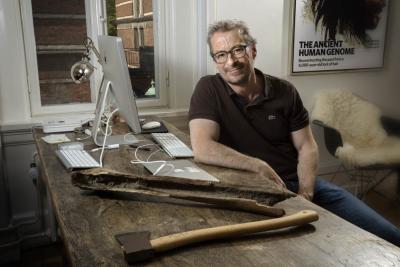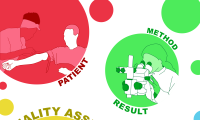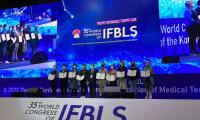Eske, Fatima and Jan are (still) joining the lab race – are you?
IFBLS 2021 - join the lab race: Forberedelserne til bioanalytikernes verdenskongres, IFBLS 2021, fortsætter. Kongressen afholdes 24-28. august i Bella Center, København. Tilmeld dig nu og få din billet refunderet, hvis kongressen aflyses.
Af Niels C. Jensen, journalist

We continue the planning of IFBLS 2021 even though COVID-19 is still a worldwide threat to the general health. It is always the authorities who permit us and other organizers to execute conferences.
The safety of the participants, speakers and sponsors is always our highest priority.
We follow the guidelines and rules connected to COVID-19 at any given time. You will have the opportunity to get the registration fee refunded if IFBLS 2021 is cancelled and/or if travel restrictions make your participation impossible.
We recommend you book transport and accommodation with option for cancellation.
- New late deadline for abstracts – posters only: 1st of July 2021
- New late deadline for registration: 11th of July 2021
Go to IFBLS2021.org to read more and join the lab race.
Look forward to meet
Eske Willerslev, Professor, GeoGenetics, University of Copenhagen
Eske Willerslev is an evolutionary geneticist. He is particularly known for sequencing the first ancient human genome and establishing the field of environmental DNA, where modern and ancient DNA from higher plants and animals are obtained directly from environmental samples.Willerslev was born in Denmark in 1971. After spending his youth as explorer and furtrapper in Siberia, he established the first ancient DNA laboratory in Denmark and obtained his DSc at University of Copenhagen in 2004.
Fatima AlZahra’a Alatraktchi, Assistant Professor, Roskilde Univer-sity and Company Founder
Fatima AlZahra’a Alatraktchi is an Engineering graduate and PhD from DTU, she has recei-ved a number of awards and honours for her work, including ‘Thesis of the Year’ at DTU and the Lundbeck Foundation’s research talent award. Her TEDx Talk, which is about using the communication of bacteria to predict disease-causing activity, has been viewed more than 14 million times, and the text has been translated into 19 different languages. In February 2019, she featured in the Forbes’ list, ‘30 under 30 - Europe’.
Jan Madsen, Professor, DTU Compute, Technical University of Denmark
Jan Madsen is a national ICT expert for EU Horizon2020 and member of the NTF eva-luation panel for Nano-Tera, a Swiss Research Program on engineering complex systems since 2013. His main research interests are related to methods and tools for systems engineering of microelectronic, micro-fluidic and microbiological computing systems. Present research covers embedded systems-on-a-chip, wireless sensor networks (Internet-of-Things), microfluidic labs-on-a-chip and synthetic biology.



